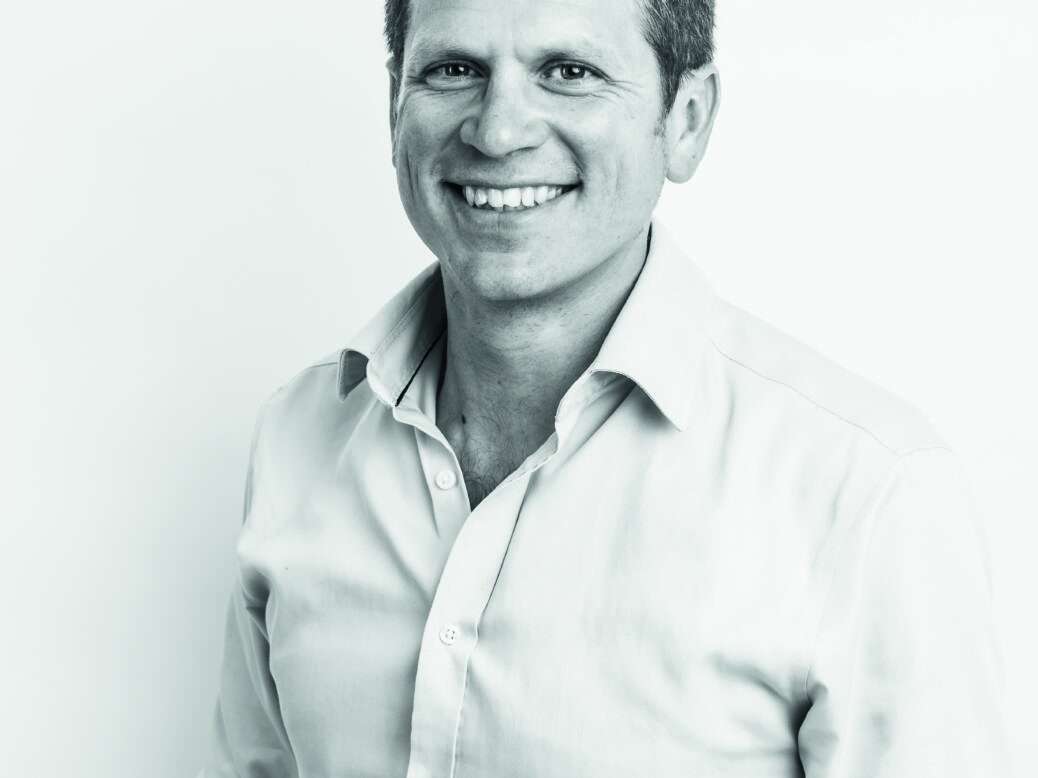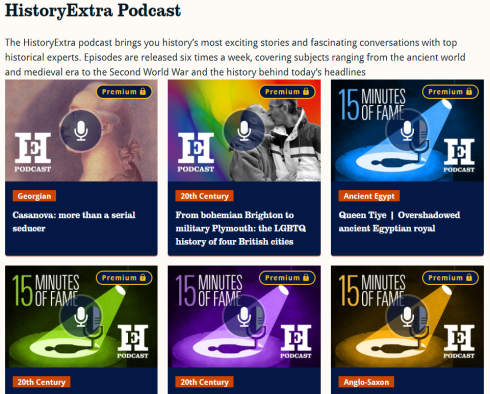
Fifteen-year-old HistoryExtra podcast at Immediate Media is on track to double revenue to more than £1m this year thanks to a huge boost to listenership and advertising as well as a new content paywall.
HistoryExtra, the podcast associated with the HistoryExtra website and BBC History magazine, hears from historians and academics in a long-form format. It also runs some multi-part narrative series on topics such as the Salem witch trials and the end of Roman Britain.
The podcast, which started monthly and now puts out six episodes per week, currently gets between 100,000 and 200,000 listeners per episode, with more than a million downloads a week and around five million a month. It has recently surpassed 150 million downloads in total since its 2007 launch.
In December the podcast introduced a paid premium feed costing £1.99 per month on Apple, which offers ad-free early access to episodes as well as some bonus content. HistoryExtra’s paying website subscribers also benefit from the premium offering.
BBC History and HistoryExtra content director David Musgrove (pictured) told the latest episode of Press Gazette’s Future of Media Explained podcast he had been “pleasantly surprised” by the number of people willing to pay, although subscription revenue remains a “fairly small” part of the money the show makes with advertising still dominant.
He said: “We’ve got a lot of people who’ve been listening to the podcast for quite a long time and… it might not be crazy to say they feel like they owe us something because they’ve been getting good content for years and years for free essentially and maybe they think, well, you know, these guys have been doing [a] good service to us, I’m happy to hand over some money to support them, to support the continued existence of the podcast.
“But then there’s also, I think, people who really do like the fact that they are part of an exclusive club getting stuff early and not being burdened by ads. I don’t know how far the ad experience is a problem for people, but it feels like there are some people who like the cleanliness of an ad-free podcast.”

Musgrove said the podcast has created a “loyal and passionate worldwide” audience worldwide, with its top five markets being in the US, UK, Australia, Canada and China, and that creating a sense of “clubbiness” was an advantage for podcasts.
“I think if you have a bit of a club feel then people feel more inclined to want to be part of that and that’s where there’s a possible value exchange that I think is quite interesting,” he said.
Where most podcasts have traditionally relied on advertising and sponsorship revenue, more publishers appear to be trying out subscriptions. For example, like HistoryExtra, slow news brand Tortoise is using Apple Podcasts Subscriptions to offer ad-free listening, early access and exclusive episodes amid a new focus on audio.
Meanwhile The Economist’s director of podcasts John Prideaux told Press Gazette in May that although its audio products are outside its paywall it is planning to experiment with a payment strategy, although its shows are currently paying for themselves with advertising revenue. Prideaux said he expected a move over the next decade toward paywalled podcasts, likening the fact they are mostly free to the industry’s belated deployment of paid news online.
Asked whether a premium offer like HistoryExtra’s could work for more publishers, Musgrove said it was “not impossible” but you need to build rapport with the audience before jumping in.
“I think you do need to have built up that credibility with your audience and that cache and have created a sense that it’s something that is worth being part of,” he said.
Musgrove added: “I think there is a general sense that subscription and paying for content in a subscriber format is a done thing nowadays. I know that maybe some people are sort of turning away from some of the higher-value subscriptions, but I think it’s still a thing and there’s more awareness that it is a possibility.”
The main revenue source for the podcast, however, remains advertising on the main feed, which is “doing very well” as it is tied to listener numbers which have seen a “good increase in numbers over the last year or so,” Musgrove said.
This growth in listeners was part down in part due to the podcast’s increase in frequency over the Covid-19 pandemic (at one point it was producing seven episodes per week before dropping back to six to give “completionist” listeners a day off) as well as the introduction of new formats such as “Everything You Wanted To Know” and special series.
HistoryExtra’s success comes amid a backdrop of growth in the podcast market, with 34% of people surveyed in 46 markets worldwide, and 25% in the UK, consuming one or more podcasts in the previous month according to the latest Reuters Institute Digital News Report, for which the polling was done in January and February.
Asked if he thought there was a risk of market saturation, Musgrove said: “I do wonder how many of the podcasts I see being launched are going to hang around.”
He explained that it is “fairly easy now” to produce a podcast but “you’ve got to commit to the long haul if you want to build an audience”.
“It is a commitment to do it and as we move out of Covid and people start to find life getting back to normal a bit, it might be something that becomes a bit onerous for people to continue to do – and you can’t do it with half measures… So you’ve got to invest in the best audio quality you can and that’s going to cost time and money.
“And if people aren’t seeing a return on it, or aren’t seeing a reason to continue doing it, then I think some of them may drop away.”
Despite this, he said, “people will continue to listen to podcasts” as it has become an established part of the routine for many.
“A lot of people are listening to podcasts instead of more traditional media, I know that anecdotally and indeed through the numbers we see,” he went on. “And I think once something’s established as a routine then people will continue to do it.
“So yeah, competition is going to hot up certainly, but I think competition may also die away for those people who don’t have a really strong reason to want to carry on doing it.”
Press Gazette is hosting the Future of Media Technology Conference. For more information, visit NSMG.live
Picture: Immediate Media
Email pged@pressgazette.co.uk to point out mistakes, provide story tips or send in a letter for publication on our "Letters Page" blog
